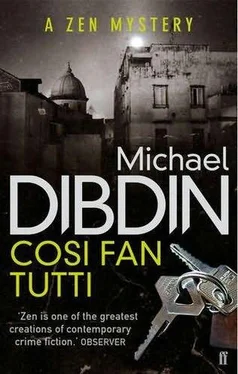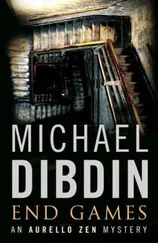Michael Dibdin - Cosi Fan Tutti
Здесь есть возможность читать онлайн «Michael Dibdin - Cosi Fan Tutti» весь текст электронной книги совершенно бесплатно (целиком полную версию без сокращений). В некоторых случаях можно слушать аудио, скачать через торрент в формате fb2 и присутствует краткое содержание. Жанр: Полицейский детектив, на английском языке. Описание произведения, (предисловие) а так же отзывы посетителей доступны на портале библиотеки ЛибКат.
- Название:Cosi Fan Tutti
- Автор:
- Жанр:
- Год:неизвестен
- ISBN:нет данных
- Рейтинг книги:3 / 5. Голосов: 1
-
Избранное:Добавить в избранное
- Отзывы:
-
Ваша оценка:
- 60
- 1
- 2
- 3
- 4
- 5
Cosi Fan Tutti: краткое содержание, описание и аннотация
Предлагаем к чтению аннотацию, описание, краткое содержание или предисловие (зависит от того, что написал сам автор книги «Cosi Fan Tutti»). Если вы не нашли необходимую информацию о книге — напишите в комментариях, мы постараемся отыскать её.
Cosi Fan Tutti — читать онлайн бесплатно полную книгу (весь текст) целиком
Ниже представлен текст книги, разбитый по страницам. Система сохранения места последней прочитанной страницы, позволяет с удобством читать онлайн бесплатно книгу «Cosi Fan Tutti», без необходимости каждый раз заново искать на чём Вы остановились. Поставьте закладку, и сможете в любой момент перейти на страницу, на которой закончили чтение.
Интервал:
Закладка:
Cosi Fan Tutti
Michael Dibdin
I
The sun had just cleared the roof-line of the five-storey buildings on Via Martucci, and in the space of a few seconds its sharply angled brilliance transformed the scene like theatre lighting revealing a stage set. Each object, however mundane, was picked out by the soft yet intense glare, and invested with a glamorous air of significance and portent.
The spectators, had there been any, would no doubt have scrutinized each object thus revealed, trying to decide on its role in the spectacle about to unfold. That tree at the corner of the two streets, for example, casting a crisp shadow across the pitted black paving slabs — was it just decorative, mere scene-setting, or was it destined to play a crucial part in the drama, to become a virtual character in its own right, perhaps as the site of the famous Act Two duet of seduction and surrender familiar to every music lover?
Similarly, the buildings so insistently yet tenderly picked out by the steadily growing light — are they simply characteristic in-fill, or will each have become individually familiar, by the time the curtain finally falls, as a source of threat or refuge? The entrances look practicable, yet the facades themselves might easily be painted flats, over-compensating for their two-dimensionality with a fussy show of detail.
Other aspects of the scene seem less problematic. Those clustered rubbish bins, for example, surely hint at the agenda of this supposedly 'radical' new production. Like the ranks of cars stacked two and even three deep in Via Greco, turning it into a car park with only a slender central aisle left free for traffic, these clearly represent a message from the director to the effect that this is Naples now, a nexus of politico-socio-economic realities very different from the picturesquely generalized setting which the composer and his librettist had in mind, providing a refreshing contemporary slant on the frankly rather trite contrivances of the original concept — although the music is divine, of course.
But despite all these cunning touches, a bare stage can hold only a limited amount of interest in the absence of any human participants to provide some dramatic point.
And here, after what seems in retrospect a perfectly judged delay, they come.
However, it is immediately clear that these are merely extras, a sort of mobile extension of the set who will fill in with some optional business the director has dreamt up before the action proper begins. In keeping with the tone of gritty realism already established, they are dressed as garbage collectors, in blue overalls, stout gloves and boots. Following a large orange truck marked Comune di Napoli, they make their way steadily down Via Strozzi, emptying the stacked bins and plastic bags of refuse, before turning right into the smaller side-street.
But now at long last one of the principals enters, not through one of the doorways but from a ramp cleverly hidden between two sections of the backdrop representing a modern apartment building to the left of Via Greco, up on the rise opposite the high wall of tufa, above which stand the gardens of an imposing villa higher up the hillside.
Despite his evident star status, he is unprepossessing in appearance. The air is mild, even at this early hour, but he is bundled up in an expensive-looking overcoat, leather gloves and a tartan scarf. In one hand he carries an executive briefcase, in the other a set of keys. He strides towards the ranks of parked cars, actuating an electronic device attached to the key-chain. One of the vehicles — a silver-grey Alfa Romeo — responds with flashing indicator lights and a series of enthusiastic beeps.
And now something strange happens, something as uncanny and yet effortless as a modulation into some remote key. To reach his car, the man must pass the orange truck heading towards the communal garbage skip outside the apartment building from which he has just emerged. As he does so, he finds his way obstructed by two of the crew who are walking alongside the truck in the narrow alley left free between the parked cars.
Rather than step into one of the spaces between the cars, the man keeps forging ahead, forcing the two blueoveralled workmen to give way to him. This they do, as though acknowledging the aura of power the man has about him, marking him as someone to be deferred to, not to be crossed. One of them moves to one side, between the silver-grey Alfa and its neighbouring vehicle, a battle scarred Fiat Uno. The other drops back, apparently waiting for the truck to pass so that he can fall in behind it and leave the way clear.
And this is where the strange thing happens. For as the male principal passes the first blue-overalled supernumerary, the latter turns around holding an object which must have been concealed in one of the many pockets of his costume. It appears to be a rolled-up newspaper, no doubt L'Unita or II Manifesto or some such publication devoted to the aspirations and struggles of the proletariat, thus tying neatly into the director's jejune rethink. In an oddly elegant gesture, the workman waves the newspaper at the man in the overcoat, as though swatting a fly circling his head. At the same moment, although without any obvious sense of cause and effect, the latter tumbles forward as if he had tripped on the raised edge of one of the black paving slabs — always a hazard, even in this relatively well-to-do area of the city Luckily the other workman, now level with the rear of the still moving truck, is just in time to catch the falling man, thus preventing him from doing himself any serious injury. The gesture seems at first to indicate a compromise in the directorial line already established — the essential goodness of people everywhere, despite the ideological gulfs that appear to divide them — which half the audience fears and the other half secretly hopes will spill over into what the latter will applaud as human warmth and the former dismiss as feeble sentimentality.
As if to confirm this hypothesis, the first workman now tosses aside his newspaper, which hits the paving stones with a sharp metallic ring, and bends to grasp the victim's feet. Without a word, the two lift him clear of the ground, holding him suspended limply in mid-air by his shoulders and calves. By now the truck, in its inexorable progress, has passed them. With a single preliminary swing they heave the inert body up and over the tail-gate, where it disappears from view.
While the first workman retrieves the wrench which was wrapped in the newspaper, his colleague presses a green button protruding from a box mounted on the rear of the truck. With a loud roaring noise, the massive ram begins to descend. The top and sides are dirty and dull, but the curved blade has been polished by constant abrasion to an attractive silvery sheen. The ram moves steadily down into the body of the truck, the racket of its powerful machinery completely obliterating any sounds which might otherwise be audible.
At this point there is a welcome touch of comedy as the man's feet appear above the tail-gate of the garbage truck. Clad in highly polished brogues and red-and-black chequered socks below which a length of bare white leg is just visible, they proceed to execute a furious little dance, jerking this way and that like puppets at a Punch and Judy show — possibly a knowing allusion to the commedia dell'arte, which of course originated in this city.
The ram has meanwhile come to a halt in a series of shudders which shake the whole truck. One of the workmen runs over and activates another button on the raised console, reversing the mechanism for a moment while his colleague stuffs the upstart limbs down and out of sight.
Then the ram continues its interrupted descent, this time completing its destined trajectory, scooping in all the rubbish which has been deposited there and crushing it into a compact mass, the individual components barely distinguishable one from another.
Читать дальшеИнтервал:
Закладка:
Похожие книги на «Cosi Fan Tutti»
Представляем Вашему вниманию похожие книги на «Cosi Fan Tutti» списком для выбора. Мы отобрали схожую по названию и смыслу литературу в надежде предоставить читателям больше вариантов отыскать новые, интересные, ещё непрочитанные произведения.
Обсуждение, отзывы о книге «Cosi Fan Tutti» и просто собственные мнения читателей. Оставьте ваши комментарии, напишите, что Вы думаете о произведении, его смысле или главных героях. Укажите что конкретно понравилось, а что нет, и почему Вы так считаете.











